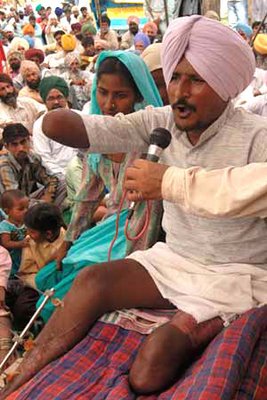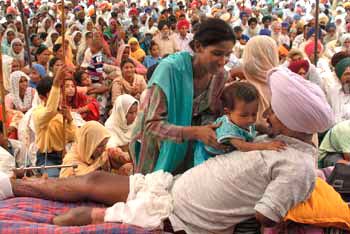Nothing can prepare you for the man in the ambulance waiting under the seething keekar tree. The arms are stumps; the left leg is amputated at the knee. The right leg socks the wind out of you. Four steel screws plunge out of his bone from shin to knee, girded together by a steel bar. The skin strains against the intrusion, protesting in blood. Inside another steel plate grates against bone, struggling to keep the smashed pieces together. The bandaged foot cannot hide the gangrene setting in. Bant Singh, 45, is about to lose his remaining toes. But his spirit — it soars. Spiralling unimprisoned beneath the baking hot sky.

"What is a little more pain?" he laughs. "They left my real weapons intact. My tongue, my voice, my mind." His stump reaches up - a memory of earlier agility - to touch his lilac turban with pride. Every time he speaks, you sense his missing limbs. He cannot move, but everything about him suggests quick movement. Bant Singh is a handsome man.
It is one of the reasons a band of upper caste Jat Sikhs beat him so mercilessly in the field that fateful January night. He wore his head too high, his turban too proud, his moustache too stiff. He insisted on living like a man in a land accustomed to shirking his shadow. That was the root enmity; the rest was just trimmings.
The ambulance waits in the compound of the CPI (ML) office in Mansa, a district in Punjab . Bhagat Singh is everywhere. A little distance away, legions of dalit landless labour and small holding Jat farmers are gathering at a rally beneath surging white canopy and red flags. The Naxal movement of the 70s had staggered feudal excesses in the better part of Punjab , but Malwa remained a preserve of old ways. Now Bant Singh has become a defining moment.
In a few minutes, he will be among the crowd, a powerful tableau on a stage, a symbol of gathering resistance across the region. As his story is told again, people break down and cry. "I remember what he looked like once. Then I remember all the suffering of my own life," says Gulab Kaur from neighbouring Barnala. Leader after leader approaches the mike and thunder for a change in social order. Then Bant breaks into song: "The history of our country teaches us this, the oppressed always wins, and our looters are destroyed." The song rips through the crowd like electricity. Out of this will Bant has turned his broken body into an effulgent sign of hope.
It is four months since Tehelka first wrote of Bant Singh, the dalit revolutionary singer brutalised for his rebel spirit. Three, since it put out an appeal for support. Readers across the country responded with generous cheques. We are travelling now to deliver the tribute - Rs 3,85,000 sent by strangers - to him. He receives it at the rally with quiet grace. "We will never forget the people who have reached out to give strength to poor men," he says. "We will continue to fight till we have breath."
You would not expect the village of Burj Jhabber to throw up a giant spirit. But Bant Singh's hut - a smudge of packed mud and crumbling, loose brick, a structure so tentative in its expectation of the world, it is not even cemented together - is testimony to the unpredictable gifts of Nature, the unpredictable visitations of the human spirit. Bant grew up in this village, the son of a landless labourer. Hungry, barefooted, often possessed of no clothes, a restlessness ran in his blood. When he was about 10 or 12, he heard the wandering mazdoor poet, Sant Ram Udasi sing at a gathering. "I heard him and felt he was singing about us," says Bant
He was rivetted. "After that I would chase him everywhere, I thirsted after his songs." The Sant's voice illuminated a world Bant could never have imagined. It sang of equality and pride and revolution. It evoked the possibility of change.
Bitten, Bant signed up with the underground Vinod-Mishra led Indian People's Front when he was about 17. Around 1992, he moved away briefly, then rejoined the overground CPI (ML). The faultlines in the village began to grow.
Mentored by veterans leftists like Sukhdarshan Singh Natt, Bant began to mobilise landless labour within and around the village, enlisting membership into the Mazdoor Mukti Morcha, galvanising them to demand minimum wages and relief from debt traps. He insisted his pigs drink from the same pond as the buffaloes of upper caste landlords. He ran a thumbprint campaign against Amrik Singh, a corrupt ration depot holder, and got his license cancelled. He took up people's cases with the police and negotiated better deals for them from the establishment.
In 2000, he committed the ultimate transgression. His 17-year old daughter Balwant Kaur was raped by two boys, Mandhir Singh, a Jat, and Tarsem Singh, a Mazbhi Sikh. Breaking established custom, Bant and his family refused to compromise. Hostilities mounted dangerously. One day, Navdeep Singh, the depot holder Amrik Singh's son, banged his motorcycle into Bant's pigs. According to Amit Prasad, SSP, Mansa, the police had to take preventive action on both sides. But these were just symptoms. As Prasad told Tehelka, "Bant used to give them back in equal measure what had traditionally been the right of the upper castes. Undoubtedly the upper castes harboured a bias against him."
On 5 January, 2006 , the bias erupted into a brutal beating. Bant Singh was cycling home late after collecting memberships for the Mazdoor Mukti Morcha from neighbouring villages. A group of youngsters attacked him in the field with hand pump handles. Bant tried to give them the slip, but they ran him down on a scooter and pulped his limbs.

When Bant's rescuers came hours later, one of the farmhands fainted at the sight. But Bant retained consciousness throughout. "I was a very strong man," Bant laughs in the ambulance, a quicksilver gleam in his eye. "I was full of muscle. I could eat two chickens at a go!" His wife, Harbans Kaur, a stoic sturdy woman, mother of eight, smiles slightly at his side.
The story of Bant Singh is the story of a giant spirit. Fired by that spirit, it is easy to forget that symbols are smelted out of the pain of flesh. The grist of life has to be lived. The brute contraption must be borne. Bant Singh's songs spiral unimprisoned beneath thebaking hot sky, but as his daughter Balwant Kaur takes her place next to him on the stage, she weeps uncontrollably by his side. His stoic wife trembles briefly.
After the crowds leave, there is still the hospital bed, and the jerking, wincing ride home. The pigs are gone - there is nobody to look after them. The family is scattered. And when you enter the tentative structure of loose brick and crumbling mud, the heat hits you like a nuclear blast. There is not enough space for five people to stand.
Yet, yet, the spirit is indomitable. Soon after the savage attack, the Congress government in Punjab awarded a Rs 10-lakh compensation to Bant and his family. (It has still not denounced the incident publicly though.) Sukhraj Natt, a local Congress politician and a known supporter of Bant's assailants, went along with the DC and SSP for a photo-op to hand the money over to Bant's wife. Harbans Kaur, sick, needy, marooned alone in the village with her eight children, scorned the cheque. "Take that man Sukhraj out of my sight," she raged, "if he touches the cheque I will not take it." Natt had to beat an undignified retreat. The officers were forced to return later with the cheque.

What will Bant do with the money, you wonder. "Raise my children," he says quietly, lying in a charpoy outside his failing hut, flanked by two police guards. The seven boys who beat him are in jail, but their benefactors, the two sarpanch brothers Niranjan Singh Sidhu and Jaswant Singh live barely half a kilometre away in a faux haveli, with bougainvillaea spilling out of their walls. "And when I am better, I will build a pucca house a little further away, closer to my people. We are too isolated here. If they ever come again, it will be too late before anyone can come to our help."
Ask the thin, attractive daughter what she will do if the men come their way again. Fire flashes in her eye. It is not easy for a rape victim to speak out in these parts. She was having an affair they say. But Balwant Kaur refuses to be cowed down. She has spoken at a labour conference in faraway Rajahmundhry, Andhra Pradesh. "I will answer their bricks with stones," she says now.
"My father never stopped fighting for me, I will never stop fighting for my father. When I went to meet him the first time in the hospital, he broke down. I told him there is no time for tears now. We must be strong." Her ailing mother is having a fit outside. Balwant steps to her without a fuss, grips her nose tightly, and waits for her to open her eyes. Her young siblings watch her mutely. Her tiny baby, Satwant is passed from arm to arm. The heat presses down on everyone. Bant, lying a little away, holds himself quietly, unable to turn.
Then suddenly, it is dusk, and time to leave. The men gather around Bant to heave him onto the stretcher. "Careful, careful," he jokes, "if any of you get a jerk, you'll drop me like a moongphali!" Harbans Kaur enters the ambulance with him. The children must remain behind. Two daughters married, one son studying in a police school in Bhatinda, and five left to fend for themselves with neighbours and aunts.
Bant Singh's song will soon be summoned to sow thirst for dignity elsewhere. Another rally, another stage, another place. As the years pass, his story will pass into folklore and strangers will draw strength from it. For the moment, we cross his ambulance in the twilight on our way home, his eyes agleam in the shadows, his leg held aloft by his wife to ease the pain of the ride.
Link
No comments:
Post a Comment
NOTE : The Comments section is provided in the interests of free speech only. It is mostly unmoderated, but comments that are off topic, offensive, slanderous, or otherwise annoying stand a chance of being deleted. The fact that any comment remains on the site IN NO WAY constitutes an endorsement by Naxal revolution, of any view expressed, fact alleged, or link provided in that comment.